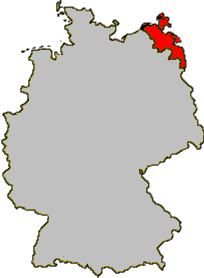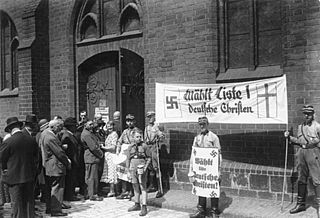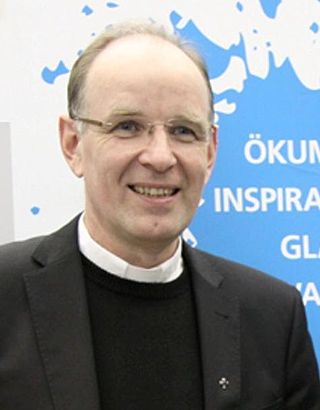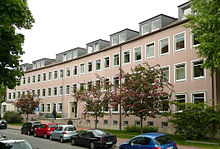
The Evangelical Church in Germany, also known as the Protestant Church in Germany, is a federation of twenty Lutheran, Reformed, and United Protestant regional Churches in Germany, collectively encompassing the vast majority of the country's Protestants. In 2022, the EKD had a membership of 19,153,000 members, or 22.7% of the German population. It constitutes one of the largest Protestant bodies in the world. Church offices managing the federation are located in Herrenhausen, Hanover, Lower Saxony. Many of its members consider themselves Lutherans.

Cuius regio, eius religio is a Latin phrase which literally means "whose realm, his religion" – meaning that the religion of the ruler was to dictate the religion of those ruled. This legal principle marked a major development in the collective freedom of religion within Western civilization. Before tolerance of individual religious divergences became accepted, most statesmen and political theorists took it for granted that religious diversity was wrong and/or weakened a state – and particularly weakened ecclesiastically-transmitted control and monitoring in a state. The principle of "cuius regio" was a compromise in the conflict between this paradigm of statecraft and the emerging trend toward religious pluralism developing throughout the German-speaking lands of the Holy Roman Empire. It permitted assortative migration of adherents to two religious groups, Roman Catholic and Lutheran, eliding other confessions.

The Pomeranian Evangelical Church was a Protestant regional church in the German state of Mecklenburg-Vorpommern, serving the citizens living in Hither Pomerania. The Pomeranian Evangelical Church was based on the teachings brought forward by Martin Luther and other Reformators during the Reformation. It combined Lutheran and Reformed traditions. The seat of the church was Greifswald, the bishop's preaching venue was the former Collegiate Church of St. Nicholas in Greifswald.

The German Evangelical Church was a successor to the German Protestant Church Confederation from 1933 until 1945. It is also known in English as the Protestant Reich Church and colloquially as the Reich Church.
The United Evangelical Lutheran Church of Germany was founded on July 8, 1948, in Eisenach, Germany. Its total membership is 7.5 million people. All its member churches belong to the Protestant Church in Germany, with which it co-operates closely. In 2018 it has been reduced from an independent legal entity to an administrative unit within the larger Protestant Church in Germany.

The Independent Evangelical-Lutheran Church is a confessional Lutheran church body of Germany. It is a member of the European Lutheran Conference and of the International Lutheran Council (ILC). The SELK has about 33,000 members in 174 congregations. The seat of SELK is in Hanover.

The Prussian Union of Churches was a major Protestant church body which emerged in 1817 from a series of decrees by Frederick William III of Prussia that united both Lutheran and Reformed denominations in Prussia. Although not the first of its kind, the Prussian Union was the first to occur in a major German state.

The Evangelical-Lutheran Church of Hanover is a Lutheran church body (Landeskirche) in the northern German state of Lower Saxony and the city of Bremerhaven covering the territory of the former Kingdom of Hanover.

The Evangelical Lutheran Church in Oldenburg is a Lutheran church in the German state of Lower Saxony.
The Evangelical Church Berlin-Brandenburg-Silesian Upper Lusatia is a United Protestant church body in the German states of Brandenburg, Berlin and a part of Saxony.

The Evangelical Lutheran Church in Brunswick is a Lutheran church in the German states of Lower Saxony and Saxony-Anhalt.
Lutheran viewpoints concerning homosexuality are diverse because there is no one worldwide body which represents all Lutherans. The Lutheran World Federation, a worldwide 'communion of churches' and the largest global body of Lutherans, contains member churches on both sides of the issue. However, other Lutherans, including the Confessional Evangelical Lutheran Conference and International Lutheran Council, completely reject homosexuality.
Buß- und Bettag was a public holiday in Germany, and is still a public holiday in Saxony. In Germany, Protestant church bodies of Lutheran, Reformed (Calvinist) and United denominations celebrate a day of repentance and prayer. It is now celebrated on the penultimate Wednesday before the beginning of the Protestant liturgical year on the first Sunday of Advent; in other words, it is the Wednesday that falls between 16 and 22 November. However, it is not a statutory non-working holiday any more, except in the Free State of Saxony. In the Free State of Bavaria, it is a school holiday only.

Ralf Meister is a German Lutheran theologian, former General Superintendent of Berlin, and Landesbischof of the Evangelical-Lutheran Church of Hanover.

Hans Joachim Schliep is a German Lutheran theologian, pastor and author. From 1990 to 1999 he was director of the Amt für Gemeindedienst, and by May 2000 the commissioner for the environment of the Church of Hanover and the Confederation of Protestant Churches in Lower Saxony. From 1999 to 2008 Schliep was the first pastor at the Kronsberg Church Centre and founder of the congregation at the Expo-neighbourhood in Kronsberg, Hanover, Lower Saxony, Germany.

The Protestant Church of Anhalt is a United Protestant member church of the Protestant Church in Germany. Its seat is in Dessau-Roßlau in Saxony-Anhalt, in the former duchy of Anhalt. This church is the smallest regional church in Germany in terms of membership.
The Confederation of Protestant Churches in Lower Saxony is the union of the five regional Protestant churches located in the Lower Saxony. The confederation meets only tasks assigned to it by the national churches. It represents the interests of Protestant regional churches towards the state of Lower Saxony.
The German Protestant Church Confederation was a formal federation of 28 regional Protestant churches (Landeskirchen) of Lutheran, Reformed or United Protestant administration or confession. It existed during the Weimar Republic from 1922 until replaced by the German Evangelical Church in 1933. It was a predecessor body to the Protestant Church in Germany.

In Protestant usage, a consistory designates certain ruling bodies in various churches. The meaning and the scope of functions varies strongly, also along the separating lines of the Protestant denominations and church bodies.

The Evangelical Lutheran Church in Northern Germany is a Lutheran member church of the Protestant Church in Germany.















